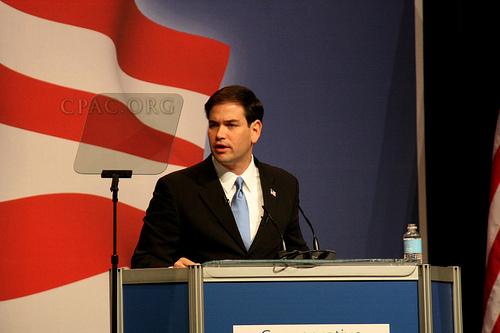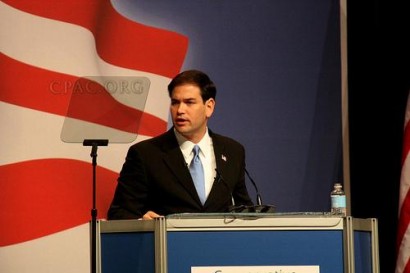As eyes turn from South Carolina to Florida for the GOP primaries, one Republican Senator who isn’t even running for president is sharing the spotlight with the Republican presidential candidates.
Senator Marco Rubio, is a rising star in the Republican party. With a Cuban background and strong conservative credentials, he won his seat in 2010 with 55 percent of the state’s Latinos voting for him. Could the addition of Rubio to the Republican ticket provide an advantage in the general election in Florida that wouldn’t have otherwise existed?
While Florida has been known to have an influential and large voting block of conservative Cuban voters, demographics in that state have transformed to a mix of Latinos from South America, Central America, Mexico as well as Cuba. Cubans – a reliable conservative voting block – now only comprise one quarter of the Latino population.
Latinos from Mexico and Central America lean Democratic, and in 2008 the Obama campaign lead an impressive voter registration effort among that group that helped tip the scales towards President Obama. Yet Marco Rubio’s success among 55 percent of the Latino vote shows that his appeal went far beyond just Cuban voters.
Dan Judy, a Republican strategist whose firm Ayres, McHenry & Associates, does the polling for Rubio, says his nomination as a VP candidate would “have an impact.”
“More than anything else he would be the first Latino to be on a presidential ticket on either side. My gut says it would have an impact but I don’t think it would be decisive,” Judy said. “But when you look at Florida it could make a difference, he’s popular with Hispanics in Florida. Even if he didn’t carry some of the western states, just carrying Florida alone might be enough to tip [the election].”
Judy concedes that in western states, the majority of the Latino population has roots in Mexico, and though Rubio is popular, his appeal would diminish as those Latinos learn about his conservative positions on immigration.
Ruben Naverrette, a Latino commentator for the San Antonio Express-News, disagrees with Judy about Rubio’s ability to bring in Latino votes. He calls Republican efforts to court Rubio attempts to use “a magic elixir” to solve their disconnect with Latino voters.
Navarrette writes critically of Rubio and his controversial stances on requiring E-verify (a federal program requiring immigration background checks for employees), voting against the Dream Act, and most recently claiming his parents were “exiles” rather than the fact that they were immigrants from Cuba. He says that “these are mistakes that Latinos won’t soon forget.”
Since Rubio has not endorsed anyone in the presidential primary and has stayed away from making comments on it, his potential appeal to the GOP candidates and among Latinos remains pure speculation. Needless to say, they’re being careful not to alienate him—granting his request to boycott a candidate debate on Univision, the leading Spanish-language TV network, after he claimed the network tried to blackmail him.
It will be telling how Mitt Romney and Newt Gingrich modify their language this week around immigration in a state with a large Latino population.
Somos Republicanos, one of the largest Latino GOP groups in the country, has endorsed Gingrich as their presidential candidate saying that he’s “been working hard for many years to include American Hispanics in the overall conversation for a better America.”
Romney’s not ready to throw in the towel in terms of Latino Republicans—he released his first campaign ad in Spanish this month as well as speaking publicly about his family’s Mexican roots.
But the truth is, Florida’s primary will tell us relatively little about Romney or Gingrich’s traction among Latino voters in a general election. Polling firms such as the Pew Forum as well as the Republican group, Ayres McHenry & Associates said it was difficult to draw any conclusions from Cuban turnout in the primaries and use it to foreshadow a Republican candidate’s appeal among Latinos in the general election.
Nate Silver of the 538 Blog on the New York Times, reports that in the 2008 Republican primary, Latino voters broke for McCain 54-14 while Romney actually won white voters. This may be good news for Gingrich if it was McCain’s more moderate stance on immigration that drew conservative Latino voters to him and put him over the top to win.
As we watch Gingrich and Romney cris-cross the state over the next ten days key areas to watch include:
- Does Romney talk more about his Mexican heritage and how his family fled there from religious persecution in the 19th century?
- Does Gingrich put forward more supportive statements on immigration calling for “a humane policy” similar to the one that drew conservative ire at a CNN debate in November.
- How will conservative voters react to potential questions posed on immigration at the debates held early this week? Will Gingrich’s moderate stance be greeted with boos and/or Romney’s hard line stance be greeted with cheers?
- Will Romney publicly back-pedal from previous immigration comments in an attempt to appeal to Latinos, or will he stand by those comments in order to win the hearts and minds of anti-immigration conservatives?
While the Florida primary may not fully represent Republican fortunes with Latinos in the general election, it’s important to keep our eyes on it for clues of how the eventual Republican nominee will frame their message to Latinos in the general election.
Feet in Two Worlds is supported by the New York Community Trust and the John S. and James L. Knight Foundation, with additional support from the Mertz Gilmore Foundation and the Sirus Fund.





